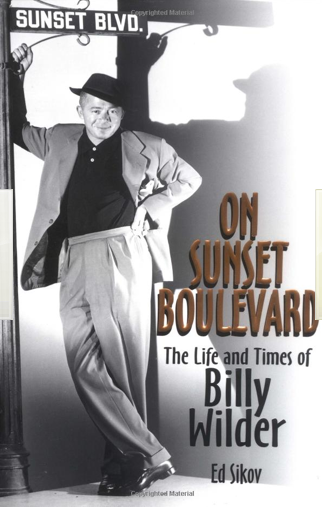 Billy Wilder’s fourth movie, Double Indemnity, a classic film noir starring Fred MacMurray and Barbara Stanwyck, was released in 1944. Billy was 38 years old.
Billy Wilder’s fourth movie, Double Indemnity, a classic film noir starring Fred MacMurray and Barbara Stanwyck, was released in 1944. Billy was 38 years old.
Now, Double Indemnity is a movie.
And a half.
This is a movie I can watch again and again and again — and never get tired of it. It crackles and sizzles and simmers with sensuality and wit.
Woody Allen (another favorite director of mine) is quoted in the book Woody Allen, by Eric Lax, as saying: 
I love it, it has all the characteristics of the classic forties film as I responded to it. It’s in black and white, it has fast badinage, it’s very witty, a story from the great age. It has Edward G. Robinson and Barbara Stanwyck and Fred MacMurray and the tough voice-over. It has brilliantly written dialogue, and the perfect score by Miklos Rozsa. It’s Billy Wilder’s best movie — but practically anyone’s best movie.
Even Billy Wilder knew the film was special. According to the superb book On Sunset Boulevard: The Life and Times of Billy Wilder, by Ed Sikov,

Billy knew it was good when he made it. He began one day of shooting by announcing to his cast and crew, “Keep it quiet! After all, history is being made.”
The story is about an insurance salesman named Walter Neff (MacMurray) who pays a house call to a client one afternoon, hoping to get him to renew an expired policy. Instead of speaking to Mr. Dietrichson, Neff instead encounters Mrs. Dietrichson (Stanwyck) looking all tempting and flirtatious. The two of them get talking and the double entendres fly fast and furious.
To make a long story short, Mrs. Dietrichson cons Neff into taking out a double indemnity insurance policy on her husband, and the two of them plot to kill the man to collect the insurance money.
Principle Cast:
Walter Neff……………………………….Fred MacMurray (1908–1991)
Phyllis Dietrichson…………………….Barbara Stanwyck (1907–1990)
Barton Keyes…………………………….Edward G. Robinson (1893–1973)
Unlike Wilder’s previous two movies, Double Indemnity wasn’t written by Wilder and Brackett. According to the book by Sikov, Brackett didn’t want any part of writing a movie he thought was unseemly. So, for this film, Billy teamed up with hard-boiled pulp writer Raymond Chandler (1888–1959), probably most famous for his novel The Big Sleep, which introduced detective Philip Marlowe to the world. Double Indemnity is based on the novel by James M. Cain, which means this is an adaptation. (Most of Hollywood’s movies are adaptations.)
Like many of Billy Wilder’s movies, this one is heavy with exposition, especially at the beginning. It, like a later Wilder classic, Sunset Boulevard, is told in flashback form via narration. Normally, exposition is a dirty word when it comes to screenwriting. It can be clunky and obvious and usually only exists to reveal information to the eavesdropping audience. But in the hands of a master like Billy Wilder, exposition becomes another character in the movie.
“I’m crazy about you, baby,” says Neff.
“I’m crazy about you, Walter,” says Mrs. Dietrichson.
And so the affair — and the plot — advances.
Straight down the line.
Double Indemnity is a smart, classy, well-acted, and thoroughly entertaining movie.

 You can call me Billy. But don't expect me to answer to that.
You can call me Billy. But don't expect me to answer to that.
No Comments so far ↓
There are no comments yet...Kick things off by filling out the form below.